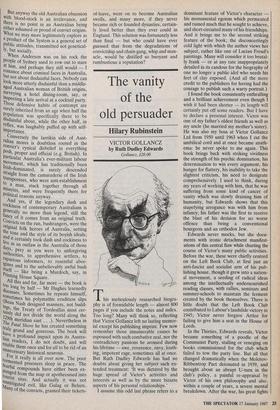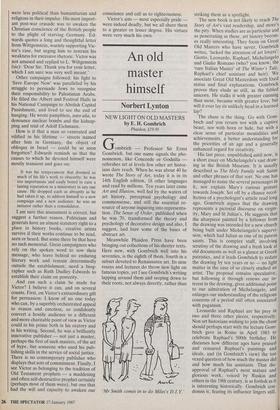The vanity of the old persuader
Hilary Rubinstein
VICTOR GOLLANCZ by Ruth Dudley Edwards Gollancz, £20.00 This meticulously researched biogra- phy is of formidable length — almost 800 pages if you include the notes and index. Too long? Many will think so, reflecting that Victor Gollancz left no lasting memor- ial except his publishing imprint. Few now remember those innumerable causes he espoused with such combative zeal, nor the contradictory passions he aroused during his lifetime — awe, reverence, envy, loath- ing, impotent rage, sometimes all at once. But Ruth Dudley Edwards has had no doubts about giving her subject such ex- tended treatment: `It was dictated by the huge spread of Victor's activities and interests as well as by the more bizarre aspects of his personal relationships.'
I assume this odd last phrase refers to a dominant feature of Victor's character his monumental egoism which permeated and ruined much that he sought to achieve, and short-circuited many of his friendships. And it brings me to the second striking feature of the book; the disconcertingly cold light with which the author views her subject, rather like one of Lucian Freud's paintings. Many will consider it too brutal- ly frank — or at any rate inappropriately detailed in its candour for the biography of one no longer a public idol who needs his feet of clay exposed. (And all the more credit to the publishers for having had the courage to publish such a warty portrait.) I found the book consistently enthralling and a brilliant achievement even though I wish it had been shorter — its length will certainly put off some readers. But I have to declare a personal interest. Victor was one of my father's oldest friends as well as my uncle (he married my mother's sister). He was also my boss at Victor Gollancz Ltd from 1950 until 1963 when I cut the umbilical cord and at once became anath- ema: he never spoke to me again. This book brings back with striking vividness the strength of his psychic domination, his determination to win every argument, his hunger for flattery, his inability to take the slightest criticism, his need to denigrate comprehensively. I used to think, during my years of working with him, that he was suffering from some kind of cancer of vanity which was slowly draining him of humanity, but Edwards shows that this stupefying arrogance was with him from infancy; his father was the first to receive the blast of his derision for no worse offence than being a conventional bourgeois and an orthodox Jew.
Edwards never mocks, but she docu- ments with ironic detachment manifest- ations of this central flaw while charting the course of Victor's many public activities. Before the war, these were chiefly centred on the Left Book Club, at first just an anti-fascist and socialist arm of his pub- lishing house, though it grew into a nation- al movement, a seeding of radical ideas among the intellectually undernourished reading classes, with rallies, seminars and summer-schools to maintain the ferment created by the book themselves. There is little doubt that the Left Book Club contributed to Labour's landslide victory in 1945; Victor never forgave Attlee for failing to give him a seat in the House of Lords.
In the Thirties, Edwards reveals, Victor became something of a poodle of the Communist Party, stalling or reneging on books commissioned for the club which failed to tow the party line. But all that changed dramatically when the Molotov- Ribbentrop Pact detonated in 1939, and brought about an abrupt U-turn in the club's policy, a painful re-appraisal by Victor of his own philosophy and also, within a couple of years, a severe mental breakdown. After the war, his great fights were less political than humanitarian and religious in their impulse. His most import- ant post-war crusade was to awaken the Christian conscience of the British people to the plight of starving Germany. Ed- wards quotes a long and thoughtful letter from Wittgenstein, warmly supporting Vic- tor's case, but urging him to restrain his weakness for excessive rhetoric. Victor was not amused and replied to L. Wiltgenstein (sic): 'Dear Sir, Thank you for your letter, which I am sure was very well meant.'
Other campaigns followed: his fight to `Save Europe Now' was paralleled by his struggle to persuade Jews to recognise their responsibility to Palestinian Arabs. He filled the Albert and Festival Halls in his National Campaign to Abolish Capital Punishment, and lived to see the end of hanging. He wrote pamphlets, inter alia, to denounce nuclear bombs and the kidnap- ping and trial of Adolf Eichmann.
How is it that a man so venerated and vilified in his lifetime — streets named after him in Germany, the object of obloquy in Israel — could be so soon forgotten? Edwards reminds us that the causes to which he devoted himself were mostly transient and goes on:
It was his temperament that doomed so much of his life's work to obscurity: he was too importunate and easily bored to earn a lasting reputation as a missionary in any one cause. He dropped each as abruptly as he had taken it up, to address himself to a new campaign and a new audience: he was an initiator rather than a consolidator.
I am sure this assessment is correct, but suggest a further reason. Politicians and generals have an almost statutory right to a place in history books, creative artists survive if their works continue to be read, seen or heard. But some there be that have no such memorial. Great campaigners who rely on the spoken word to sow their message, who leave behind no enduring literary work and remain determinedly outside the establishment, need a biog- rapher such as Ruth Dudley Edwards to establish their claim on posterity.
And can such a claim be made for Victor? I believe it can, and on several counts. First, on Victor's extraordinary gift for persuasion: I know of no one today who can, by a superbly orchestrated appeal to reason and emotion, so confidently convert a hostile audience to a different and more charitable point of view as Victor could in his prime both in his oratory and in his writing. Second, he was a brilliantly innovative publisher — not just a master, perhaps the first of such masters, of the art of hype, but someone who used his pub- lishing skills in the service of social justice. There is no contemporary publisher who displays that sort of commitment. Finally, I see Victor as belonging to the tradition of Old Testament prophets — a maddening and often self-destructive prophet certainly (perhaps most of them were), but one that had the will and capacity to awaken our conscience and call us to righteousness.
Victor's sins — most especially pride were indeed deadly, but we all share them to a greater or lesser degree. His virtues were very much his own.











































 Previous page
Previous page